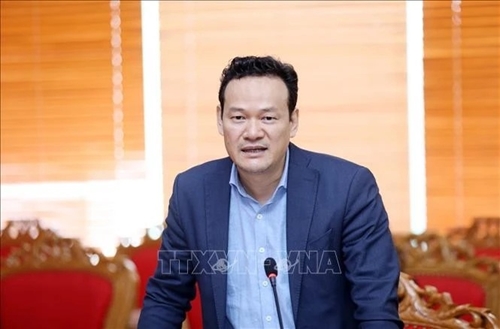May 28, 2025 | 21:58 (GMT+7)
Vietnamese diplomat praises legal support from WTO advisory center
Ambassador Mai Phan Dung has expressed appreciation for the ongoing legal support provided by the Advisory Center on World Trade Organization (WTO) Law (ACWL), saying that it has been critical in helping Vietnam navigate the complexities of global trade landscape since joining the WTO in 2007.
During a seminar with the ACWL in Geneva on May 27, Dung, who is head of Vietnam’s Permanent Mission to the United Nations, the WTO, and other international organizations in Geneva, outlined Vietnam’s socio-economic progress, acknowledging both the strides made and the challenges faced as a WTO member.
    |
 |
|
Ambassador Mai Phan Dung, head of Vietnam’s Permanent Mission to the United Nations, the WTO, and other international organizations in Geneva |
He lauded the ACWL for its role in strengthening the knowledge about international trade law for Vietnam’s legal and diplomatic personnel through specialized training, workshops, and advisory services. Since Vietnam became an ACWL member in late 2009, the centre’s legal and technical assistance has been pivotal in enhancing the country’s capability to engage in WTO dispute settlement processes, he noted.
In light of the US’s recent announcement regarding new tariff plans, ACWL legal experts provided an overview analysis of Washington’s retaliatory measures in relation to WTO rules. They also further discussed recently negotiated bilateral trade agreements, noting that they may qualify as free trade agreements (FTAs) exempt from the Most-Favored-Nation (MFN) obligation only if they comply with Article XXIV of the 1994 General Agreement on Tariffs and Trade (GATT). This requires the removal of barriers on almost trade between the parties, a criterion that the current bilateral deals under discussion have yet to meet.
The seminar featured a legal Q&A session chaired by Pham Quang Huy, deputy head of Vietnam’s Permanent Mission to Geneva. Huy served as a liaison, addressing queries raised by representatives from various Vietnamese ministries.
Established in 2001, the ACWL provides legal advice, training, and dispute settlement support for developing and underdeveloped countries upon request. Despite the WTO Appellate Body remaining dormant since 2019, the WTO dispute resolution mechanism is still widely regarded as one of the most effective in modern international law. Independent bodies like the ACWL are essential in ensuring that developing and underdeveloped nations can fully benefit from the opportunities provided by the WTO.
Source: VNA